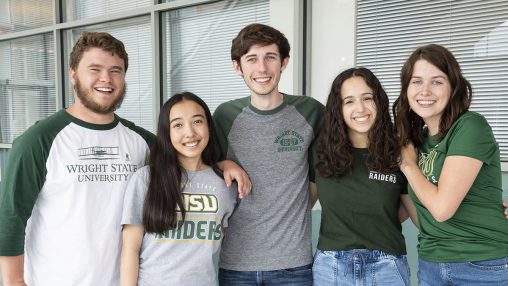
Member of Wright State’s International Genetically Engineered Machines (iGEM) team include, from left: Ryan Elam, Natasha Kennel, Austin Schroeder, Madeline Gruenberg and Christina Davis.
A group of Wright State University students is developing a synthetic-biology research project that will be presented at the International Genetically Engineered Machines (iGEM) competition.
The inaugural Wright State iGEM team is part of Biotechnology Outreach Bolstered through Education in STEM and Development (BiOBESTD), a three-year program from the Department of Defense to develop a workforce in biotechnology in the United States.
Scientists from Wright State’s Department of Biochemistry and Molecular Biology and the Air Force Research Laboratory (AFRL) are mentoring the team. The collaborative effort will continue to strengthen the connections between the two groups.
The field of synthetic biology applies engineering principles to biological systems to help solve real-world problems. Researchers engineer organisms including bacteria to produce specific molecules, materials or to respond dynamically to an environment.
The goals of the iGEM competition are to expose students to scientific research from the point of initial design through execution and prepare them to present and logically defend their research to judges.
Christina Davis, who earned her bachelor’s degree in biochemistry and molecular biology in May and interns at the AFRL, said the iGEM competition provides a platform to promote the research through a Wiki-page that presents the teams’ projects, results and outreach that bridges the gap between biological research and other fields like computer science, communication and education.
“Being part of an iGEM team is an incredible opportunity because it gives students the chance to discover and create in the field of synthetic biology and only be limited by their own minds,” said Davis. “It teaches students how to design and execute research projects and collaborate with other teams internationally.”
The iGEM teams are comprised of high school, undergraduate, graduate, and above graduate-level students who use the principles of synthetic biology to create research projects.
“The biggest challenge for the team will be having the world as the oyster of possibility and problems to solve utilizing synthetic biology,” said Davis. “Synthetic biology has a world of applications, and truly defining what the team is interested in will be the critical point.”
Wright State’s team includes Davis, of Beavercreek; Austin Schroeder, a biochemistry and molecular biology major from Englewood; Natasha Kennel, a neuroscience major from Beavercreek; Madeline Gruenberg, a biochemistry and molecular biology major from Centerville; and Ryan Elam, a biochemistry and molecular biology and neuroscience major from Miamisburg.
“iGEM will provide students the opportunity to develop critical thinking skills to solve problems they see in their daily lives,” Davis said. “Students will find a deeper meaning for the purpose of science, while also gaining skills in communication as they have to present their research project to mentors and other scientists in the field. It also gives the opportunity for international collaboration and chances to meet and speak with experts in the field of molecular biology and synthetic biology.”
Kennel said she is passionate about STEM and international relations and iGEM encompassed both of her interests perfectly.
“The people I’ve met so far through iGEM have been super hard-working and enthusiastic, and I can’t wait to see what else unfolds from this opportunity,” she said.
“As scientists, it’s important to experience when experiments do not go perfectly and learn how to adapt and troubleshoot to advance the project,” added Davis. “As much as this team will be exposed to lab skills, it will also develop critical soft skills through presentations, networking and communicating its research to the broader community.”
iGEM projects require many skill sets involving benchtop research, website design, education of the community and communication. Experience is not always necessary, and students are still being recruited. Students interested in joining the team should contact wrightstateigem@gmail.com.
The team can be followed on Instagram and Twitter @igemwrightstate.

 Gov. DeWine reappoints Board Treasurer Beth Ferris and names student Ella Vaught to Wright State Board of Trustees
Gov. DeWine reappoints Board Treasurer Beth Ferris and names student Ella Vaught to Wright State Board of Trustees  Joe Gruenberg’s 40-Year support for Wright State celebrated with Honorary Alumnus Award
Joe Gruenberg’s 40-Year support for Wright State celebrated with Honorary Alumnus Award  Wright State’s elementary education program earns A+ rating for math teacher training
Wright State’s elementary education program earns A+ rating for math teacher training  Wright State’s Calamityville hosts its largest joint medical training operation
Wright State’s Calamityville hosts its largest joint medical training operation  Wright State University launches Strategic Plan 2030 to advance student success, enhance role as regional economic driver
Wright State University launches Strategic Plan 2030 to advance student success, enhance role as regional economic driver 